Chocolate Shrimp, Aaron Kitchen’s signature appetizer, features shrimp sautéed with garlic and bits of chili until aromatic, cooked with high heat in Kahlúa then drizzled with house special chocolate sauce. Both savory and sweet, fragrant and spicy, its conflicting yet surprisingly harmonious flavor makes this a “must-order” dish among regulars. Unlike your average restaurant, customers at Aaron Kitchen can see Chef Sung Chin-Lung and his two assistants busily working about in the kitchen through a large glass window. On the wall there are two Chinese characters “persevere” written in a childlike hand and framed in a wooden frame.
“A lot of people supported my dreams along the way. That’s how I managed to keep on going to this day.” Known among his friends as Brother Lung, Sung Chin-Lung is of Pinuyumayan and Pangcah descent. He started out with a small café in Taipei, which later became an Italian restaurant, and then moved to Hualien and opened Aaron Kitchen. Each shift brought him closer to his childhood home in Likavung Community, Taitung, and increased his sense of indigenous identity.
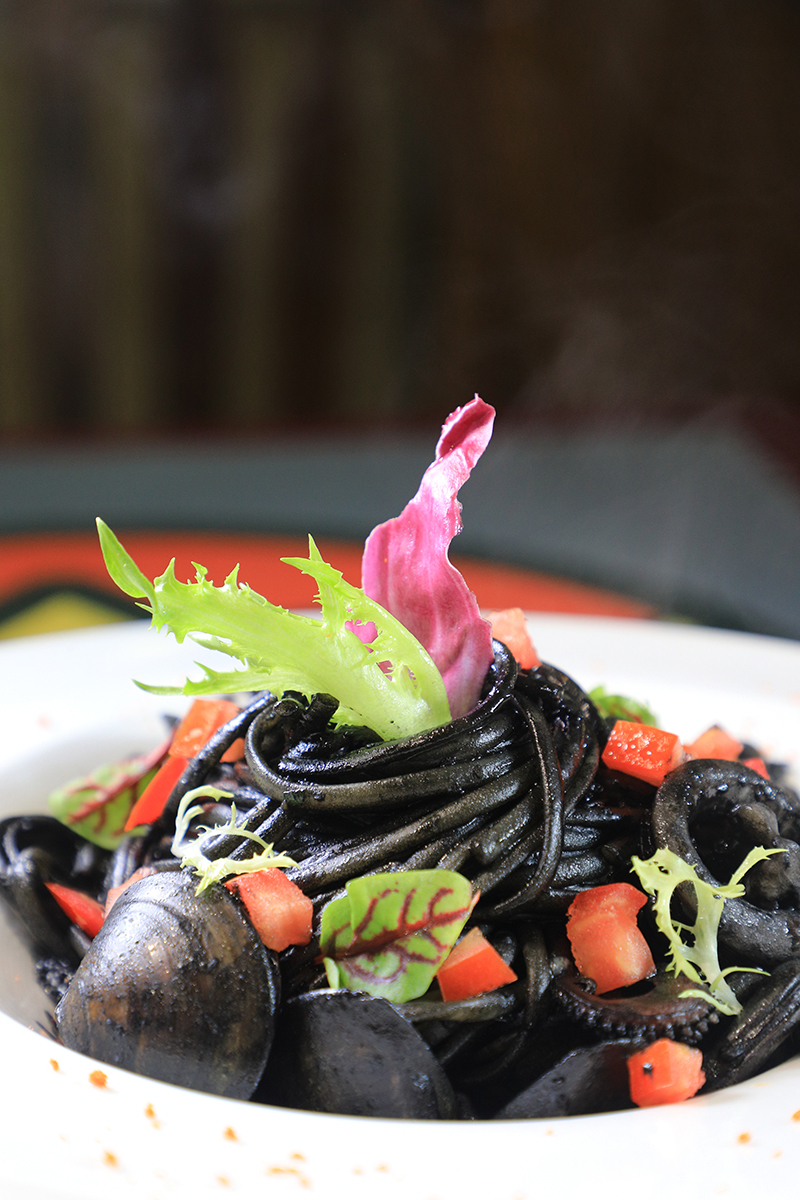
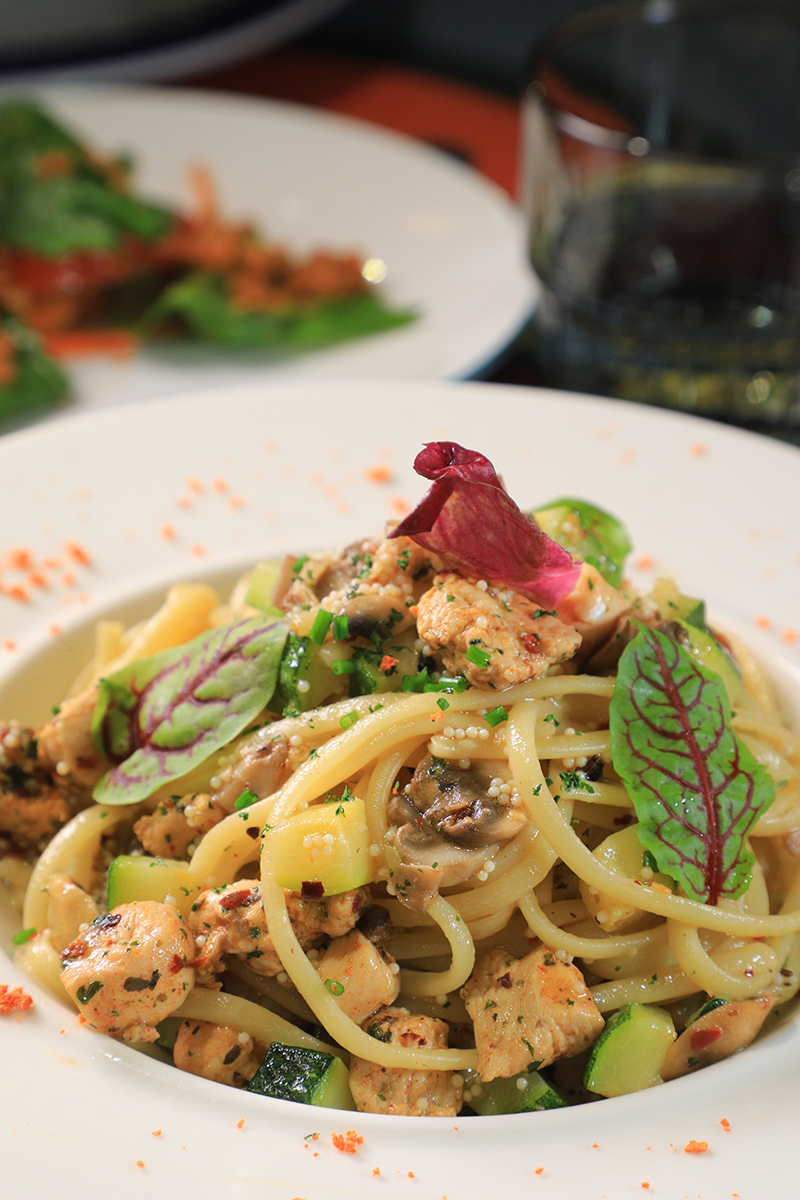
Linguine with squid in ink sauce (left), alibangbang roe spaghetti (right)
Grandma’s “Who are you?”
Made Him Start to Think About His Indigenous Identity
Likavung Village was deeply Japanized during the Japanese Occupation Period: the area had the highest education prevalence rate in Taitung. Sung Chin- Lung, the eldest grandson in the family, was raised by his grandmother. He grew up in a poor household, therefore most of his memories of Likavung involved hard work and grandma’s punishments. Sung went to school in the western part of Taiwan when he was older and suffered much ridicule from schoolmates because of his indigenous heritage. Young Sung Chin- Lung fought hard to detach himself from all indigenous stereotypes. He even swore he would never marry an indigenous woman.
Sung described his experience of leaving the community and living alone in the city as “I was a child running in the rain – no one was there to hold out an umbrella for me, so I could only keep on running.” Sung Chin-Lung spent 22 years in the city, and eventually became a skilled chef working in hotels who specializes in Italian and French cuisines. Feeling very proud of himself, Sung returned to Likavung and was eager to share his accomplishments with his grandma. Yet his elderly grandmother, who had not seen him for a very long time, did not recognize her adult grandson. “Who are you? ” asked the puzzled old woman.
Grandma’s initial response hit Sung’s heart like a rock - causing ripples and then falling heavily. He rode his scooter to the top of the hill and looked at the distance village where he grew up. He asked himself, “she’s right. Who am I?” Sung Chin-Lung realized no matter how successful his career was, he would never feel like he belonged anywhere if he cut all connections with his hometown. The indigenous legacy he had been running from all these years lies deep in his heart and can never be severed.
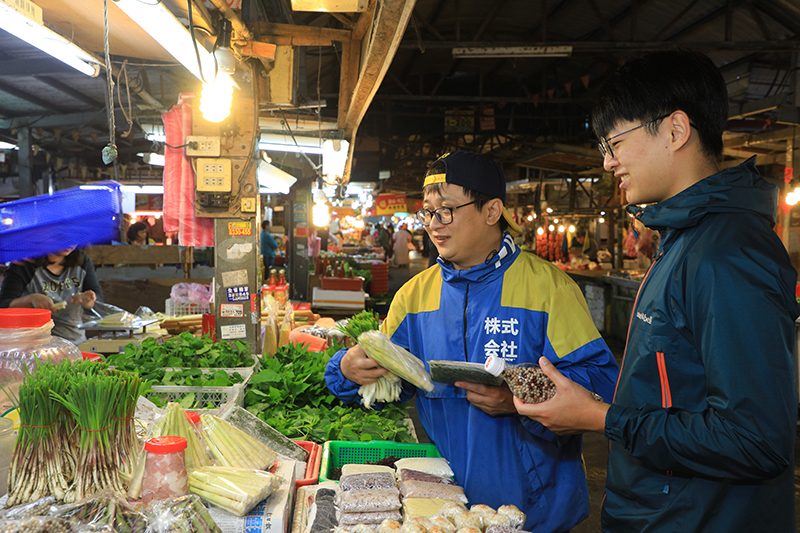
Sung Chin-Lung estimates the amount of ingredients he will need for the day’s orders. He shops at the market daily for produce and meat to present the freshest tastes to his customers. Sung Chin-Lung and his assistant are pictured here selecting suitable ingredients at the indigenous wild vegetable stall.
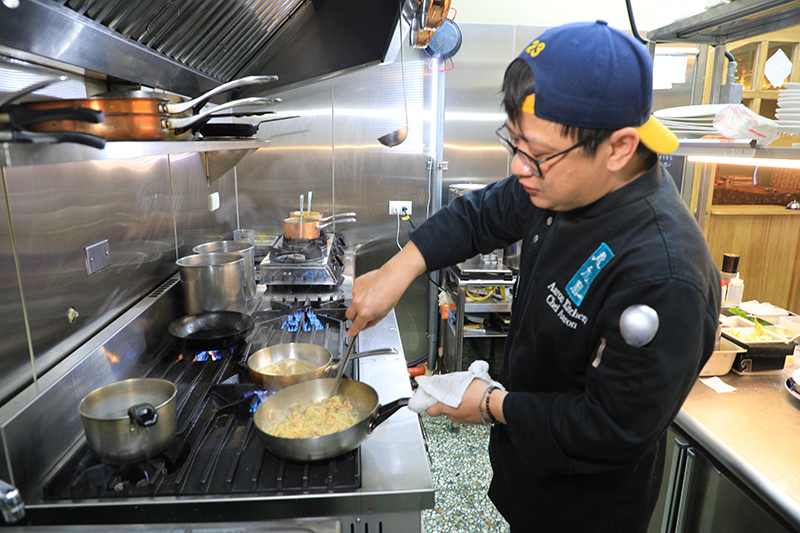
Ingredients may taste different due to season and environment. Sung Chin- Lung carefully monitors the quality of every dish, but does not deliberately adjust the original taste of the food. Instead, he explains to the customers why the dish tastes different when he serves them.
Recreating Community Atmosphere
and Pleasant Memories in Taipei
So Sung Chin-Lung returned to Taipei and opened Likavung Cafe, which later expanded into Likavung Italian Restaurant. The restaurant offered a rare relaxing atmosphere on Yitong Street, a street filled with restaurants. There were no fancy decorations in Likavung Italian Restaurant, only village children’s school bags, photos of the community’s everyday life, and unique indigenous-style items. Sung even painted a border at the entrance at the ground floor, indicating customers arrive in Taitung when they enter the restaurant.
“I hoped Likavung Italian Restaurant would become the Likavung Village in Taipei. I wanted to bring the community vibe into the city.” Sung Chin-Lung remembered when he was a child, he lived with his Pangcah maternal grandmother for a while. Pangcah women care for their sisters' children as their own, so when meal time came, he would ride his bicycle to one of his five aunties’ homes for food. This has long been a treasured piece of memory for Sung and one he hopes to share with others; thus, honoring the Pangcah spirit, Sung cooks in the city to feed fellow community members, family and friends.
Sung also made many friends with similar mindsets via social media where he shared his thoughts on realizing his dreams in the food & drink business. Sung Chin-Lung believes that an authentic Italian restaurant should allow friends to be loud, merry and have a good time. The chef should not be cooking alone in another room; rather, he should be yelling at raucous customers who have their own opinions. Other customers wouldn’t mind the friendly shouting and would carry on enjoying their meals. Another interesting turn was that Sung eventually broke the declaration he made in his youth (not to marry an indigenous woman) and married Zhang Xiao-Ru, who is from the same village. Since Zhang is very close with her family, Sung Chin-Lung was offered a second chance to “re-know” his community. They began to return to Likavung Village almost every month, and even collected donations to buy bicycles for local children for several consecutive years.
Six years ago, with encouragement from the late head of My Humble House Group Tsai Chen-Yang, Sung Chin-Lung moved his business back to eastern Taiwan and opened Aaron Kitchen in Hualien City. Sung did not bring many things from Taipei with him. In fact, only two things from Taipei are on display in his new restaurant: a photograph with his grandmother in 2009, when he first returned to Likavung community as an adult; and the two Chinese characters for “persevere”, written by an elementary school student who often visited Sung’s first café in Taipei to do his homework.
Italians and Taiwanese Indigenous Peoples:
Romantics who Share Similar Cooking Styles
When it comes to cuisines, Sung Chin-Lung doesn’t really specify whether a dish he made is “Italian” or “indigenous”. He believes Italians and Taiwanese indigenous peoples share similarities in food and ingredient handling. For example, seafood have a distinctive smell, but after you stirfried them with garlic over hot fire, the stink becomes a delicious smell that bounces through the air, just like cooking anchovies in European cuisine – the seafood stink becomes the best natural flavor enhancer. And Sung’s recent new dish, alibangbang roe spaghetti, has juicy flying fish roe that pops in your mouth, which is similar to caviar spaghetti.
Those are not the only similarities the two groups of people share. Italians live close to the Mediterranean Sea and often use seafood in their dishes – the Pangcah people also view the sea as their ingredient fridge. The famous Italian prosciutto is not cooked but only cured with salt and air-dried, a food processing method that is also used on the Pangcah's cured pork. Both use curing to preserve food for a longer time. The warm spinach salad, which is very popular in Italy, triggers another childhood memory. “When we were little, we would just put salt on wild vegetables and eat them!“ said Sung with a laugh.
“And Italians, like the indigenous peoples, they are a romantic bunch who go with their feelings and don’t like to be restricted.” Sung Chin-Lung pointed out this is the reason he enjoys making no-menu meals. Cooking is a specific area where Sung can let his imagination run wild, from choosing the ingredients and how to prepare them into fusion dishes, to the tableware and plating.
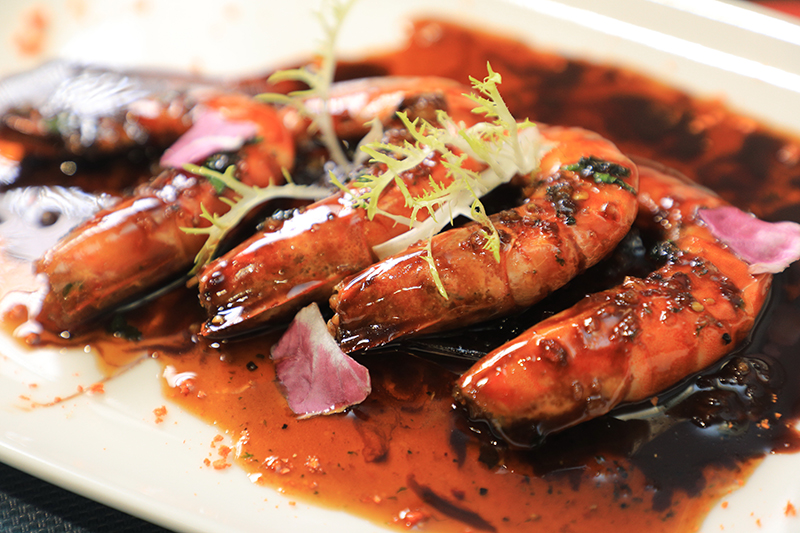
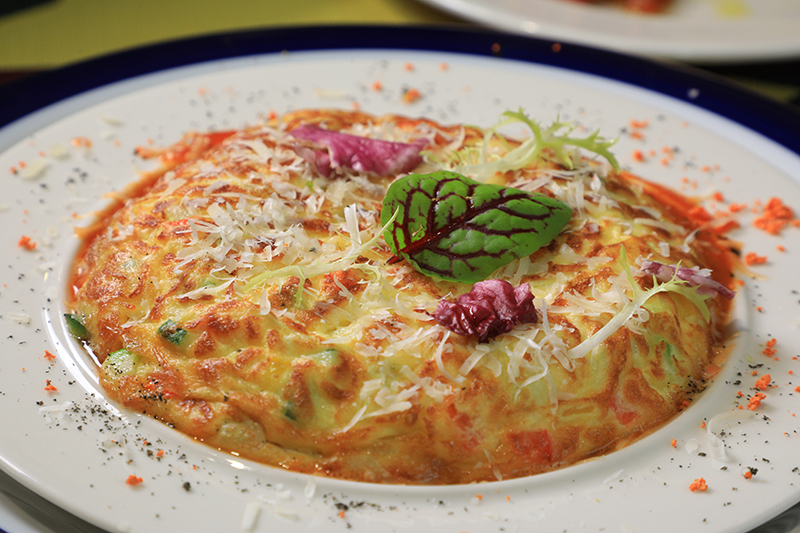
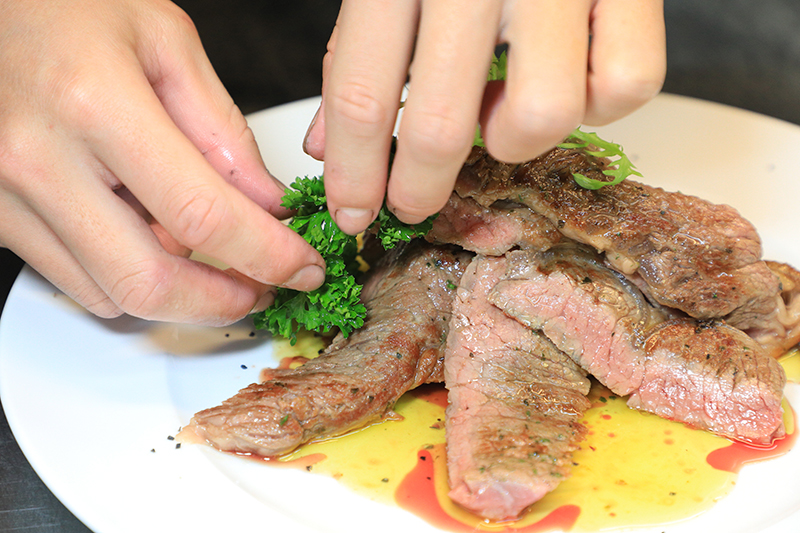
Aaron Kitchen’s dishes may seem very Italian, but they are actually blended with Pangcah seasoning styles and offer flavors with a generous amount of indigenous flair.
Food Cooked by Indigenous Peoples
is Indigenous Cuisine
Sung Chin-Lung also uses popular traditional indigenous ingredients such as may chang, rattan palm heart, and Japanese prickly ash in his cooking, but does not abuse them just because he wants to emphasize his indigenous heritage. He believes the cook need to prioritize ingredients according to the essence of the cuisine. When he employs western cooking methods, which call for an exact amount of strong seasonings to enhance the dish’s flavor, he would pair may chang olive sauce with rib eye steak, and pigeon peas in butter bacon risotto to bring out the strong bean scent.
“I’ve always wanted to build an indigenous team.” During his many years in the business, Sung Chin- Lung has trained a couple of indigenous assistants who now each have their own careers, some are even working overseas. Now Sung still insists on passing on the iron will he gained firsthand in the kitchens to indigenous youths. In fact, Sung is happy to share his secrets. He set up the Cuisine Experiment Lab where he shares his own experience and results in fusing local ingredients with Italian and French cuisine with local mothers who love cooking and B&B owners.
From running from his indigenous roots to gradually gaining confidence through cooking and returning to his hometown, Sung Chin-Lung doesn’t need external clothing or adornments to know where he belongs anymore. Now he can proudly say, “I am indigenous and I make indigenous cuisine.”
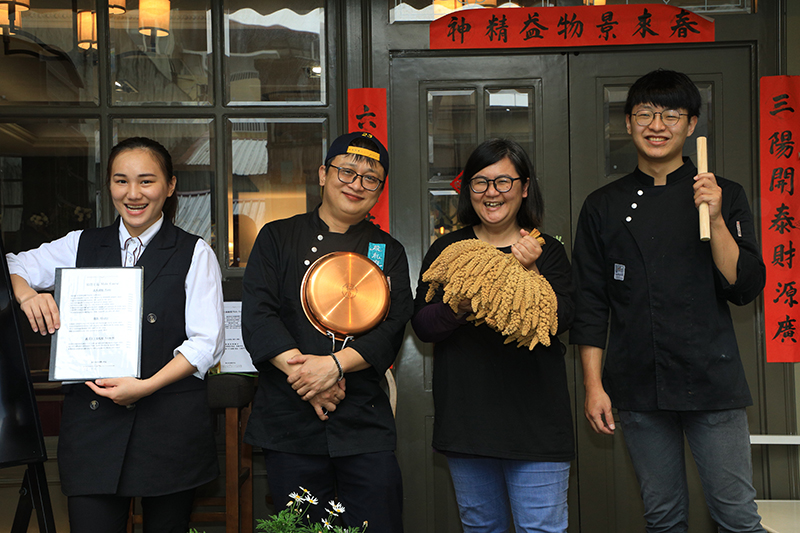
Sung Chin-Lung (second left) and Zhang Xiao-Ru (second right) opened Aaron Kitchen in Hualien City. But Sung Chin-Lung still hopes to open a restaurant in Taipei someday to challenge his limits.




